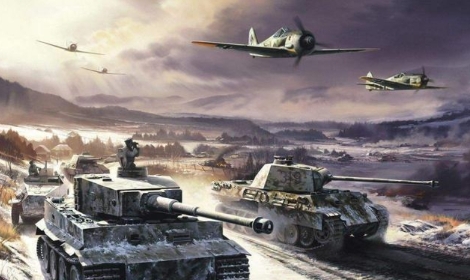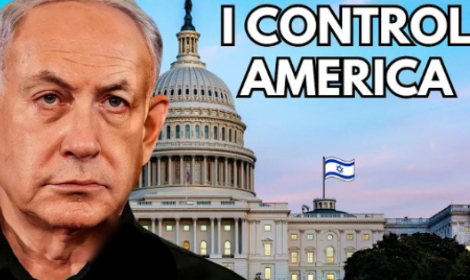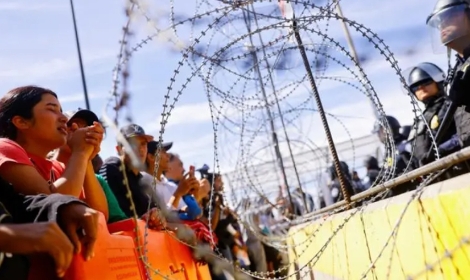为什么美国会输掉越南战争?
正文翻译
为什么美国会输掉越南战争?
评论翻译
Khalid Elhassan
As a preliminary, of course we lost the war. The US spent 10 years, hundreds of billions of dollars (trillions, in today's money), sacrificed almost 60,000 American lives, and suffered hundreds of thousands of American wounded. Aside from the millions of deaths suffered by our Vietnamese allies, Vietnamese foes, but mostly by innocent Vietnamese civilians. The justification for all that blood and sacrifice was to prop up the South Vietnamese government, maintain the sovereignty of South Vietnam, and keep her from going communist. It was all for nothing: when the dust settled South Vietnam no longer existed, had been swallowed up by North Vietnam, and was now communist.
毫无疑问,美国输掉了越南战争。美国投入了十年时间,花费了数百亿甚至相当于今天的数千亿美金,牺牲了近 6 万名美国士兵,还有数十万美国人受伤。除此之外,还有数百万越南盟友、越南敌人,但主要是无辜的越南平民死亡。
造成所有这些血腥和牺牲的理由,是为了支持南越政府,维护南越的主权,以及阻止其走向共产主义。然而这一切都徒劳无功:战火平息后,南越已经不复存在,被北越吞并,变成了共产党国家。用任何客观的标准衡量,如此巨大的牺牲却一无所获,都算是失败。
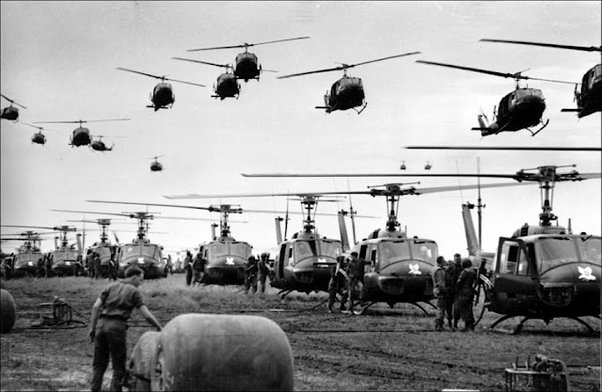
Sacrificing so much for nothing counts as a loss by any obxtive standard. The US killed more Vietnamese than Vietnamese killed Americans, but that's irrelevant. We went into Vietnam in order to accomplish something other than simply running up a high body count of unarmed or poorly armed Third Worlders. We spent a lot and sacrificed a lot in order to accomplish that something. That something wasn't accomplished. Ergo, "loss".
美国虽然杀死了更多的越南人,但那并不重要。我们进入越南是为了完成一些事情,而不仅仅是为了增加杀害手无寸铁或装备简陋的第三世界士兵的数量。我们投入了大量资金和人员,是为了实现某些目标,但这些目标都没有实现。因此,美国输了。
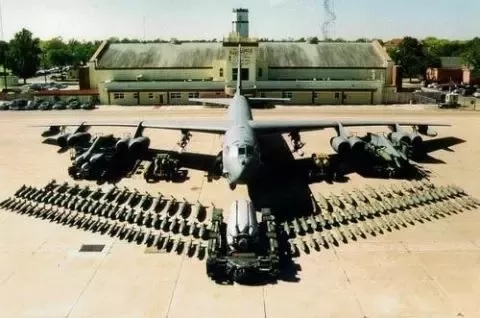
As to why we lost, myriad reasons, but the most important one is that our enemies simply wanted it more than we did, and were willing to endure far more punishment and make far greater sacrifices to achieve their goals than we were willing to endure and make to accomplish ours. It was their country at the end of the day, and we were a foreign armed presence in a country whose national identity and history revolves around and was shaped by a 1000+ year struggle against armed foreign hegemony.
至于我们为什么会输,原因有很多,但最重要的一点是,我们的敌人比我们更渴望胜利,他们愿意忍受更多的痛苦和做出更大的牺牲来实现他们的目标。归根结底,这是他们的国家,而我们只是 一个武装的外来势力,干涉一个有着 1000 多年反抗武装外国统治的国家认同和历史。
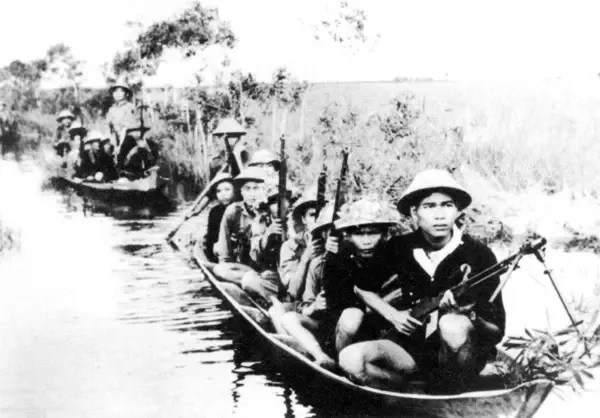
For the average Vietnamese arrayed against us, the sacrifice necessary to get rid of the armed foreigner in their country was worth it, while for the average American the sacrifice necessary to prop up a corrupt and inept government in some far off place eventually became too much.
对于普通的越南士兵来说,为了摆脱他们国家的外国武装势力而做出的牺牲是值得的,而对于普通的美国人来说,为了在遥远的地方支持一个腐败无能的政府而做出的牺牲最终变得毫无意义。
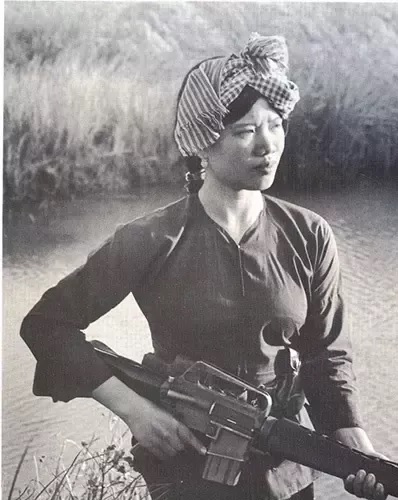
There were also moral factors - Americans never collectively rallied around and supported this war because much of the country couldn't bring itself to see America as the good guys in Vietnam. For the good reason that we really were not the good guys:
还有道德因素 - 美国人民从未团结起来支持这场战争,因为许多美国人无法将美国视为越战的正义一方。原因很简单,我们并不是真正的正义一方:
First, we started our involvement by supporting the French in their fight to hold on to their colony. So in a fight between a foreign colonizing power trying to maintain its hegemony vs an occupied colonized people fighting for their freedom, we sided with the oppressor and against the oppressed underdog.
首先,我们介入越南战争是从支持法国殖民统治开始的。因此,在一场殖民国家维护其霸权与被占领殖民地人民争取自由的斗争中,我们站在了压迫者一方,反对被压迫的弱者。
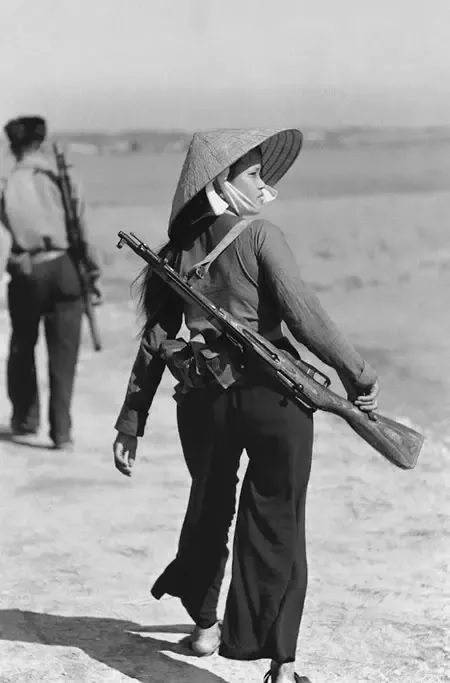
Second, after the Viet Minh defeated the French and liberated their country, we prevented free democratic elections from taking place because we knew the winner would be Ho Chi Minh and his Viet Minh, whom we opposed. I.e.; we stood in the way of democracy/ were anti-democracy.
其次,在越南人民军击败法国并解放了他们的国家之后,我们阻止了自由民主选举的进行,因为我们知道获胜者将是胡志明和他的越南人民军,而我们反对他们。换句话说,我们阻碍了民主,是反民主的。
Third, we ensured that instead of a unified country, which was the clear will of the majority (a majority will we made sure would never get expressed in the polls by preventing elections from taking place), Vietnam was split between a nationalist North which, commie or not, had successfully fought to free their country from foreign occupation, and a corrupt US stooge government in the South with little popular support or legitimacy.
第三,我们确保越南不是一个统一的国家,尽管这是大多数人的意愿(我们通过阻止选举来确保这种意愿永远不会在投票中表达出来)。越南分裂为民族主义的北方(无论是否是共产主义国家),他们成功地将国家从外国占领中解放出来;以及南方由美国扶持的傀儡政府,缺乏民众支持和合法性。
Fourth, we killed a few million Vietnamese when points one through three resulted in the inevitable war for reunification. And the reunification, by the Viet Minh, still happened despite all our efforts.
第四,由于第一到第三点导致了不可避免的统一战争,我们杀害了几百万越南人。尽管我们付出了所有努力,越南还是在越南人民军的领导下实现了统一。
And our military's treatment of the Vietnamese throughout was often unconscionable, such as in the My Lai Massacre when a US infantry company went on a rampage of rape and murder that resulted in over 500 dead Vietnamese civilians, mostly women and children, even infants. Only one American was prosecuted, and he served only 3 years, under house arrest, before being pardoned by Nixon.
美国军队在整个战争期间的所作所为常常令人无法容忍,例如美莱村大屠杀,美国步兵连进行了强奸和杀戮的暴行,导致 500 多名越南平民死亡,其中大部分是妇女和儿童,甚至包括婴儿。只有一名美国人被起诉,并且只在家中监禁服刑 3 年,然后被尼克松赦免。
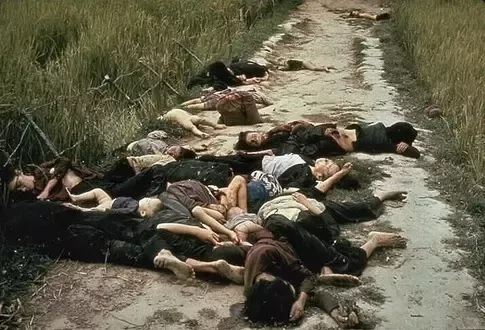
There were good wars this country fought, and some iffy ones. But the only war in which we were the clear cut evil guys who deserved to lose was Vietnam.
美国打过一些正义的战争,也打过一些不明智的战争。但唯有越南战争,我们是彻头彻尾的恶人,理应输掉。
Nguyễn Linh
They backed the wrong side
it’s about as easy as it comes
the north did not want to be south vietnamese And the south did not hold the land they took.
So with every push north no progress was made and within a few hour to a few day soldiers would come back to the occupied space.
the south likely wouldn’t have won. Even if they won the military effort.
the issue is that the US was the occupier. And they stepped into a situation where they simply couldn’t put themself in the right view of the people.
If they knew the situation right they would have likely support the north effort
因为他们选错边了。
这本来是一件很简单的事
北越不想归入南越,南越也没有守住他们占领的土地。
所以每次向北越推进,都无法取得任何进展,短则几个小时,长则几天,士兵们就会退回被占领的地区。
南越很可能赢不了,虽然他们在军事努力上确实更胜一筹。
问题在于美国是占领方。他们陷入了一种局面,他们根本无法理解越南人民的想法。
如果他们了解形势,也许应该支持北越。
Layla Palmer
The United States faced challenges and ultimately did not achieve its obxtives in the Vietnam War:
美国在越南战争中面临巨大困难,最终未能实现目标。
1.Guerrilla Warfare Tactics: The North Vietnamese and Viet Cong forces employed effective guerrilla warfare tactics, including ambushes, booby traps, and hit-and-run attacks, which exploited the weaknesses of conventional U.S. military strategies and equipment.
2.Lack of Clear obxtives: The U.S. involvement in Vietnam lacked clear and achievable obxtives, leading to confusion and a lack of direction in the military campaign. The shifting goals and strategies contributed to public disillusionment and undermined support for the war effort.
1.游击战战术:北越和越队采用了有效的游击战战术,包括伏击、陷阱和击跑配合等战术,这些战术可以非常有效地打击美国传统军事战略和装备的弱点。
2.缺乏明确的目标:美国介入越南,缺乏明确和可实现的目标,导致军事行动混乱无序、缺乏方向。目标和战略的频繁转变导致了民众的觉醒,削弱了对战争行动的支持。
3.Political Instability in South Vietnam: The South Vietnamese government faced internal corruption, inefficiency, and lack of popular support, which undermined its ability to govern effectively and counter the insurgency.
4.Opposition at Home: The Vietnam War sparked widespread opposition and protests in the United States, fueled by concerns about the morality, cost, and legitimacy of the war. Public pressure and anti-war sentiment influenced political decisions and limited the government's ability to escalate the conflict.
3. 南越的政治不稳定:南越政府面临着内部腐败、效率低下和缺乏民众支持的问题,这削弱了其有效治理和打击叛乱的能力。
4. 国内抗议:越南战争在美国引发了广泛的反对和抗议,人们对战争的正当性、花费和合法性感到担忧。公众压力和反战情绪影响了美国的政治决策,限制了美国政府升级战局的能力。
5.Military Challenges: The harsh terrain, dense jungles, and difficult weather conditions in Vietnam posed significant challenges for U.S. troops, who were often ill-equipped and unprepared for the guerrilla warfare tactics employed by the enemy.
6.Attrition Strategy: The U.S. military pursued a strategy of attrition, focusing on body counts and killing enemy combatants, rather than wng hearts and minds or addressing the underlying political and social issues driving the conflict. This approach proved ineffective in defeating the insurgency.
5.军事挑战:越南恶劣的地形、茂密的丛林和严酷的天气条件给美军士兵带来了巨大的挑战,他们经常缺乏足够的装备,对越南军队采用的游击战战术毫无准备。
6.消耗战:美国军方奉行消耗战,关注死亡人数和杀害敌方士兵,而非努力赢得人心或解决导致冲突发生的潜在政治和社会问题。事实证明,这种方法在打击叛乱方面是毫无作用的。
7.Limited Support from Allies: The United States faced challenges in garnering support from international allies and partners for its involvement in Vietnam, limiting its ability to rally broader international support for the war effort.
8.Role of Media: The Vietnam War was the first conflict to be extensively covered by the media, leading to increased scrutiny and public awareness of the war's realities, including its human costs and atrocities. Media coverage played a significant role in sha public opinion and undermining support for the war.
7. 盟友的支持有限:美国难以获得国际盟友和合作伙伴对其参与越南战争的支持,这也限制了美国为越南战争争取更广泛国际支持的能力。
8. 媒体的作用:越南战争是人类历史上第一次被媒体广泛报道的军事冲突,媒体受众对战争的局势,包括战争的伤亡和残酷的审视和了解越来越深。媒体报道在塑造公众舆论和削弱对战争的支持方面也发挥了重要的作用。
In summary, a combination of factors, including effective guerrilla tactics by the North Vietnamese and Viet Cong, lack of clear obxtives, political instability in South Vietnam, opposition at home, and military challenges, contributed to the United States' failure to achieve its goals in the Vietnam War.
总之,包括北越和越共的游击战术、目标不明、南越政局不稳、国内的反对抗议和军事挑战等在内的一系列因素都导致了美国在越南战争中的失败。
Shahzaib Khan
There are several factors that contributed to the United States not achieving its obxtives in the Vietnam War. Some reasons include the guerrilla warfare tactics used by the Viet Cong, the lack of public support and protests back home, the challenging terrain and climate in Vietnam, and the difficulties in wng the hearts and minds of the Vietnamese people. It was a complex and multifaceted conflict with no easy answers.
有几个因素导致美国没能实现其在越南战争中的预定目标。原因包括越共使用的游击战战术十分奏效,美国得不到国内公众的支持,反战抗议频发,越南的地形和气候条件十分艰苦,同时美国无法赢得越南人的民心。这是一场复杂而多面的军事冲突,美国之所以失败的答案无法一言概之。
P. J. M. Sweet.
The U.S. armed forces leadership’s biggest weakness in the Vietnam War was twofold:
First, the political and military leadership broke a first principle of war that one never, never underestimates one’s enemy: The U.S. military leadership and U.S. forces in Vietnam grossly underestimated their enemy in the Vietnamese revolutionary-nationalist forces and the capacity of the revolutionary-nationalist forces to fight: The Vietnamese revolutionary-nationalist forces comprised both the guerrillas of the National Liberation Front of Southern Vietnam and the People’s Liberation Armed Forces (NLF/PLAF) and the soldiers of the People’s Army of Vietnam (PAVN), North Vietnam’s regular army.
美国军队高层在越南战争中有两个最大的弱点:
首先,政治和军事领导人打破了战争的第一原则,即永远不要低估自己的敌人:美国军事领导人和驻越美军严重低估了他们的敌人—越南革命民族主义力量和革命民族主义力量的战斗实力;越南革命民族主义力量包括南越民族解放阵线和人民解放武装部队的游击队,以及北越正规军越南人民军的士兵。
PAVN soldiers were sent from North Vietnam to join and reinforce the roving detachments of regional- and main-force NLF/PLAF guerrillas waging war in South Vietnam or sometimes to operate on their own in the South independently of NLF/PLAF formations.
Next, the U.S. military leadership in South Vietnam was presented with a war that it did not know how to fight and resorted to the application of massive firepower to attrite or reduce the enemy, wear him down, and break his will to resist by inflicting massive military and civilian casualties to force the enemy to yield: this signally failed.
越南人民军的士兵从北越派往南越,加入并增援在南越作战的民族解放阵线/人民解放军游击队的地区和主力游记分队,有时也独立于民族解放阵线/人民解放军部队在南越作战。
其次,南越的美军领导层面临着一场不知道如何进行的战争,他们使用大量火力来消耗或减少敌人,消耗敌人,并通过制造大量军民伤亡来打破敌人的抵抗意志,迫使敌人屈服:而这正是一个失败的信号。
Despite the enormous casualties inflicted by U.S. forces and sustained by the Vietnamese revolutionary-nationalist forces and the Vietnamese civilian populace, the enemy did not yield and unrelentingly continued to fight.
Short of killing 80 percent or more of the Vietnamese population, north and south, the wholesale attrition of the enemy was not a viable strategy. It has been truly said that attrition is the strategy of no strategy.
尽管美军造成了巨大的人员伤亡,越南革命民族主义力量和越南平民也承受了巨大的伤亡,但越南人没有屈服,继续战斗。
如果无法杀死80%甚至更多的越南人口(南越和北越),那么大规模消耗敌人就不是一个可行的策略。有人说过,人员损耗是下下策。
As it was, the U.S. military intervention in the Vietnam War directly and indirectly caused the deaths of 3.2 million Vietnamese, devastated the country, mostly of course south of the Demilitarized Zone at the 17th parallel of latitude, and obviously ended in the ultimate failure of the fighting arms of the U.S. armed forces and their allies to gain or secure strategic victory and in the subsequent withdrawal of all U.S. and allied foreign forces from South Vietnam. The American war in Vietnam was militarily and politically a clear strategic defeat for the United States and its allies.
C’est la guerre.
事实上,美国对越南战争的军事干预直接或间接地造成了320万越南人的死亡,摧毁了这个国家,当然了,这主要集中在南纬17度的非军事区以南,显然以美国武装部队及其盟友的失败而告终,他们无法获得或确保战略胜利,所以美国及盟国最终从南越撤军了。在越南战争中,美国及盟友在军事上和政治上都只收获了明显的失败。
William Vandenbulcke
It was arrogance ,naivety and the American can do attitude that lost the war.
In 1956 the US stopped the plebiscite vote of the people to reunify Vietnam as one country. Why as. we knew the YES vote would prevail and Vietnam would be Co unist. So we supported the corrupt former South Vietnamese French lackeys. A no win move.
是美国人的傲慢、天真和誓不罢休的态度让他们输掉了战争。
1956年,美国阻止了越南人民为统一越南而进行的公民投票。为什么呢。因为我们很清楚,多数民众会投出赞成票,越南会成为gc主义国家。所以我们支持腐败的前南越法国走狗。这本身就是一个没有胜算的昏招。
Mike Brant
The answers you’ve been getting are all good, but very limited - given the complexty of the issue. There is a better resource, and you can read it free at any public library in America - The Pentagon Papers.
The fact is, the United States got into the Vietnam War as the result of a huge number of errors. the Pentagon Papers are official US Government classified papers released by a reporter, Daniel Ellsberg, and the revelations within shook both the CIA and the Pentagon to their core.
你看到的这些答案都说得不错,但还是有很大的局限性—这个问题确实也很复杂。其实还有一个更好的信息资源,你可以在美国的公共图书馆免费查阅—五角大楼文件。
事实是,美国卷入越南战争是大量错误叠加的结果。五角大楼文件是由记者丹尼尔·埃尔斯伯格发布的美国政府的官方机密文件,其中披露的内容震惊了中央情报局和五角大楼。
Roger A. Newman
We do get tired of repeating, we did not “lose” the war in Vietnam, but we fought a war with little to be proud of, many books have been written on the utter stupidity.
Brief and incomplete order of events, as it is very complicated:
我们已经受够了不断重复声明我们并未“输掉”越南战争,但这确实是一场不太值得骄傲的战争,很多书都提到了这场战争的愚蠢。
事件的简单和不完整的顺序,因为它是非常复杂的:
(1) When Nixon was elected, he started to pull troops out and started more strategic bombing of the North, slower than he had promised.
(2) His bombing eventually destroyed much of the North’s infrastructure and harbors. Much of their supplies (most from USSR) then came overland.
(3) The North then went to the bargaining table, The Paris Peace Accords, which up to that point they had refused to do.
(4) They agreed to pull out if we pulled out and stopped fighting. We did and they kind of did.
(1) 尼克松当选后就开始撤军,开始对北越进行更多的战略轰炸,但比他承诺的要来得慢一些。
(2) 他的轰炸最终摧毁了北越的大部分基础设施和港口。北越的大部分补给(多数都来自苏联)都是通过陆路运输的。
(3) 北越终于回到谈判桌前,签订了《巴黎和平协定》,而在此之前,他们一直拒绝签署该协定。
(4) 他们同意,如果美国撤军并停止战斗就退军。我们做到了,他们也做到了。
(5) For two years there was relative peace, although the Vietcong and North continued a limited war. (The North spent these 2 years building up their heavy army, more like WWII motorized Cavalry.
(6) After two years they came over the border full force and most of the resistance was poor as we had trained the South to fight the VC gorillas. They soon overran Saigon.
(7) The U.S. had promised intervention in the form of air support, but congress was too busy impeaching Nixon and did not respond.
(8) three cheers for congress, almost 60,000* good young men died for their politics, the cream of our youth.
(5) 尽管越共和北越继续进行小规模战争,但在两年时间内局势较为和平。(北越花了两年时间打造重型武装军队,类似二战期间的摩托骑兵。
(6) 两年后,他们全副武装越过边境,大多数抵抗力量都很弱,因为我们训练南方军队对付越共的大猩猩。他们很快就占领了西贡。
(7) 美国曾承诺会以空中支援的形式进行干预,但当时国会忙于弹劾尼克松,没有作出回应。
(8) 为国会高呼三声,近六万名优秀的美国年轻人为了国会的政治主张而献出了生命,他们是美国青年中的精英。
*The wall has over 58,300 names on it, all verified, yet our government claims fewer.
*这面墙上刻有超过58,300个名字,都是经过一一核实的,但我们的政府公布的死亡人数比这个数字少。
Son Tung Dinh
They lost for so many reasons. But I think they can all be summed up in one sentence: They were on the wrong side.
他们失败的原因太多了。但我认为可以用一句话来概括:他们选错边了。
Peter James
We lost because it was never intended to be won. That war was nothing more than ten years of obscene profits for the US military complex, with lucrative kick backs to senators and congressmen who prolonged it.
我们战败了,是因为我们从来都没有想过要赢。那场战争只不过给美国军工企业带来了十多年的巨额利润,拖延战争的参议员和国会议员都获得了丰厚的回扣。
As a preliminary, of course we lost the war. The US spent 10 years, hundreds of billions of dollars (trillions, in today's money), sacrificed almost 60,000 American lives, and suffered hundreds of thousands of American wounded. Aside from the millions of deaths suffered by our Vietnamese allies, Vietnamese foes, but mostly by innocent Vietnamese civilians. The justification for all that blood and sacrifice was to prop up the South Vietnamese government, maintain the sovereignty of South Vietnam, and keep her from going communist. It was all for nothing: when the dust settled South Vietnam no longer existed, had been swallowed up by North Vietnam, and was now communist.
毫无疑问,美国输掉了越南战争。美国投入了十年时间,花费了数百亿甚至相当于今天的数千亿美金,牺牲了近 6 万名美国士兵,还有数十万美国人受伤。除此之外,还有数百万越南盟友、越南敌人,但主要是无辜的越南平民死亡。
造成所有这些血腥和牺牲的理由,是为了支持南越政府,维护南越的主权,以及阻止其走向共产主义。然而这一切都徒劳无功:战火平息后,南越已经不复存在,被北越吞并,变成了共产党国家。用任何客观的标准衡量,如此巨大的牺牲却一无所获,都算是失败。

Sacrificing so much for nothing counts as a loss by any obxtive standard. The US killed more Vietnamese than Vietnamese killed Americans, but that's irrelevant. We went into Vietnam in order to accomplish something other than simply running up a high body count of unarmed or poorly armed Third Worlders. We spent a lot and sacrificed a lot in order to accomplish that something. That something wasn't accomplished. Ergo, "loss".
美国虽然杀死了更多的越南人,但那并不重要。我们进入越南是为了完成一些事情,而不仅仅是为了增加杀害手无寸铁或装备简陋的第三世界士兵的数量。我们投入了大量资金和人员,是为了实现某些目标,但这些目标都没有实现。因此,美国输了。

As to why we lost, myriad reasons, but the most important one is that our enemies simply wanted it more than we did, and were willing to endure far more punishment and make far greater sacrifices to achieve their goals than we were willing to endure and make to accomplish ours. It was their country at the end of the day, and we were a foreign armed presence in a country whose national identity and history revolves around and was shaped by a 1000+ year struggle against armed foreign hegemony.
至于我们为什么会输,原因有很多,但最重要的一点是,我们的敌人比我们更渴望胜利,他们愿意忍受更多的痛苦和做出更大的牺牲来实现他们的目标。归根结底,这是他们的国家,而我们只是 一个武装的外来势力,干涉一个有着 1000 多年反抗武装外国统治的国家认同和历史。

For the average Vietnamese arrayed against us, the sacrifice necessary to get rid of the armed foreigner in their country was worth it, while for the average American the sacrifice necessary to prop up a corrupt and inept government in some far off place eventually became too much.
对于普通的越南士兵来说,为了摆脱他们国家的外国武装势力而做出的牺牲是值得的,而对于普通的美国人来说,为了在遥远的地方支持一个腐败无能的政府而做出的牺牲最终变得毫无意义。

There were also moral factors - Americans never collectively rallied around and supported this war because much of the country couldn't bring itself to see America as the good guys in Vietnam. For the good reason that we really were not the good guys:
还有道德因素 - 美国人民从未团结起来支持这场战争,因为许多美国人无法将美国视为越战的正义一方。原因很简单,我们并不是真正的正义一方:
First, we started our involvement by supporting the French in their fight to hold on to their colony. So in a fight between a foreign colonizing power trying to maintain its hegemony vs an occupied colonized people fighting for their freedom, we sided with the oppressor and against the oppressed underdog.
首先,我们介入越南战争是从支持法国殖民统治开始的。因此,在一场殖民国家维护其霸权与被占领殖民地人民争取自由的斗争中,我们站在了压迫者一方,反对被压迫的弱者。

Second, after the Viet Minh defeated the French and liberated their country, we prevented free democratic elections from taking place because we knew the winner would be Ho Chi Minh and his Viet Minh, whom we opposed. I.e.; we stood in the way of democracy/ were anti-democracy.
其次,在越南人民军击败法国并解放了他们的国家之后,我们阻止了自由民主选举的进行,因为我们知道获胜者将是胡志明和他的越南人民军,而我们反对他们。换句话说,我们阻碍了民主,是反民主的。
Third, we ensured that instead of a unified country, which was the clear will of the majority (a majority will we made sure would never get expressed in the polls by preventing elections from taking place), Vietnam was split between a nationalist North which, commie or not, had successfully fought to free their country from foreign occupation, and a corrupt US stooge government in the South with little popular support or legitimacy.
第三,我们确保越南不是一个统一的国家,尽管这是大多数人的意愿(我们通过阻止选举来确保这种意愿永远不会在投票中表达出来)。越南分裂为民族主义的北方(无论是否是共产主义国家),他们成功地将国家从外国占领中解放出来;以及南方由美国扶持的傀儡政府,缺乏民众支持和合法性。
Fourth, we killed a few million Vietnamese when points one through three resulted in the inevitable war for reunification. And the reunification, by the Viet Minh, still happened despite all our efforts.
第四,由于第一到第三点导致了不可避免的统一战争,我们杀害了几百万越南人。尽管我们付出了所有努力,越南还是在越南人民军的领导下实现了统一。
And our military's treatment of the Vietnamese throughout was often unconscionable, such as in the My Lai Massacre when a US infantry company went on a rampage of rape and murder that resulted in over 500 dead Vietnamese civilians, mostly women and children, even infants. Only one American was prosecuted, and he served only 3 years, under house arrest, before being pardoned by Nixon.
美国军队在整个战争期间的所作所为常常令人无法容忍,例如美莱村大屠杀,美国步兵连进行了强奸和杀戮的暴行,导致 500 多名越南平民死亡,其中大部分是妇女和儿童,甚至包括婴儿。只有一名美国人被起诉,并且只在家中监禁服刑 3 年,然后被尼克松赦免。

There were good wars this country fought, and some iffy ones. But the only war in which we were the clear cut evil guys who deserved to lose was Vietnam.
美国打过一些正义的战争,也打过一些不明智的战争。但唯有越南战争,我们是彻头彻尾的恶人,理应输掉。
Nguyễn Linh
They backed the wrong side
it’s about as easy as it comes
the north did not want to be south vietnamese And the south did not hold the land they took.
So with every push north no progress was made and within a few hour to a few day soldiers would come back to the occupied space.
the south likely wouldn’t have won. Even if they won the military effort.
the issue is that the US was the occupier. And they stepped into a situation where they simply couldn’t put themself in the right view of the people.
If they knew the situation right they would have likely support the north effort
因为他们选错边了。
这本来是一件很简单的事
北越不想归入南越,南越也没有守住他们占领的土地。
所以每次向北越推进,都无法取得任何进展,短则几个小时,长则几天,士兵们就会退回被占领的地区。
南越很可能赢不了,虽然他们在军事努力上确实更胜一筹。
问题在于美国是占领方。他们陷入了一种局面,他们根本无法理解越南人民的想法。
如果他们了解形势,也许应该支持北越。
Layla Palmer
The United States faced challenges and ultimately did not achieve its obxtives in the Vietnam War:
美国在越南战争中面临巨大困难,最终未能实现目标。
1.Guerrilla Warfare Tactics: The North Vietnamese and Viet Cong forces employed effective guerrilla warfare tactics, including ambushes, booby traps, and hit-and-run attacks, which exploited the weaknesses of conventional U.S. military strategies and equipment.
2.Lack of Clear obxtives: The U.S. involvement in Vietnam lacked clear and achievable obxtives, leading to confusion and a lack of direction in the military campaign. The shifting goals and strategies contributed to public disillusionment and undermined support for the war effort.
1.游击战战术:北越和越队采用了有效的游击战战术,包括伏击、陷阱和击跑配合等战术,这些战术可以非常有效地打击美国传统军事战略和装备的弱点。
2.缺乏明确的目标:美国介入越南,缺乏明确和可实现的目标,导致军事行动混乱无序、缺乏方向。目标和战略的频繁转变导致了民众的觉醒,削弱了对战争行动的支持。
3.Political Instability in South Vietnam: The South Vietnamese government faced internal corruption, inefficiency, and lack of popular support, which undermined its ability to govern effectively and counter the insurgency.
4.Opposition at Home: The Vietnam War sparked widespread opposition and protests in the United States, fueled by concerns about the morality, cost, and legitimacy of the war. Public pressure and anti-war sentiment influenced political decisions and limited the government's ability to escalate the conflict.
3. 南越的政治不稳定:南越政府面临着内部腐败、效率低下和缺乏民众支持的问题,这削弱了其有效治理和打击叛乱的能力。
4. 国内抗议:越南战争在美国引发了广泛的反对和抗议,人们对战争的正当性、花费和合法性感到担忧。公众压力和反战情绪影响了美国的政治决策,限制了美国政府升级战局的能力。
5.Military Challenges: The harsh terrain, dense jungles, and difficult weather conditions in Vietnam posed significant challenges for U.S. troops, who were often ill-equipped and unprepared for the guerrilla warfare tactics employed by the enemy.
6.Attrition Strategy: The U.S. military pursued a strategy of attrition, focusing on body counts and killing enemy combatants, rather than wng hearts and minds or addressing the underlying political and social issues driving the conflict. This approach proved ineffective in defeating the insurgency.
5.军事挑战:越南恶劣的地形、茂密的丛林和严酷的天气条件给美军士兵带来了巨大的挑战,他们经常缺乏足够的装备,对越南军队采用的游击战战术毫无准备。
6.消耗战:美国军方奉行消耗战,关注死亡人数和杀害敌方士兵,而非努力赢得人心或解决导致冲突发生的潜在政治和社会问题。事实证明,这种方法在打击叛乱方面是毫无作用的。
7.Limited Support from Allies: The United States faced challenges in garnering support from international allies and partners for its involvement in Vietnam, limiting its ability to rally broader international support for the war effort.
8.Role of Media: The Vietnam War was the first conflict to be extensively covered by the media, leading to increased scrutiny and public awareness of the war's realities, including its human costs and atrocities. Media coverage played a significant role in sha public opinion and undermining support for the war.
7. 盟友的支持有限:美国难以获得国际盟友和合作伙伴对其参与越南战争的支持,这也限制了美国为越南战争争取更广泛国际支持的能力。
8. 媒体的作用:越南战争是人类历史上第一次被媒体广泛报道的军事冲突,媒体受众对战争的局势,包括战争的伤亡和残酷的审视和了解越来越深。媒体报道在塑造公众舆论和削弱对战争的支持方面也发挥了重要的作用。
In summary, a combination of factors, including effective guerrilla tactics by the North Vietnamese and Viet Cong, lack of clear obxtives, political instability in South Vietnam, opposition at home, and military challenges, contributed to the United States' failure to achieve its goals in the Vietnam War.
总之,包括北越和越共的游击战术、目标不明、南越政局不稳、国内的反对抗议和军事挑战等在内的一系列因素都导致了美国在越南战争中的失败。
Shahzaib Khan
There are several factors that contributed to the United States not achieving its obxtives in the Vietnam War. Some reasons include the guerrilla warfare tactics used by the Viet Cong, the lack of public support and protests back home, the challenging terrain and climate in Vietnam, and the difficulties in wng the hearts and minds of the Vietnamese people. It was a complex and multifaceted conflict with no easy answers.
有几个因素导致美国没能实现其在越南战争中的预定目标。原因包括越共使用的游击战战术十分奏效,美国得不到国内公众的支持,反战抗议频发,越南的地形和气候条件十分艰苦,同时美国无法赢得越南人的民心。这是一场复杂而多面的军事冲突,美国之所以失败的答案无法一言概之。
P. J. M. Sweet.
The U.S. armed forces leadership’s biggest weakness in the Vietnam War was twofold:
First, the political and military leadership broke a first principle of war that one never, never underestimates one’s enemy: The U.S. military leadership and U.S. forces in Vietnam grossly underestimated their enemy in the Vietnamese revolutionary-nationalist forces and the capacity of the revolutionary-nationalist forces to fight: The Vietnamese revolutionary-nationalist forces comprised both the guerrillas of the National Liberation Front of Southern Vietnam and the People’s Liberation Armed Forces (NLF/PLAF) and the soldiers of the People’s Army of Vietnam (PAVN), North Vietnam’s regular army.
美国军队高层在越南战争中有两个最大的弱点:
首先,政治和军事领导人打破了战争的第一原则,即永远不要低估自己的敌人:美国军事领导人和驻越美军严重低估了他们的敌人—越南革命民族主义力量和革命民族主义力量的战斗实力;越南革命民族主义力量包括南越民族解放阵线和人民解放武装部队的游击队,以及北越正规军越南人民军的士兵。
PAVN soldiers were sent from North Vietnam to join and reinforce the roving detachments of regional- and main-force NLF/PLAF guerrillas waging war in South Vietnam or sometimes to operate on their own in the South independently of NLF/PLAF formations.
Next, the U.S. military leadership in South Vietnam was presented with a war that it did not know how to fight and resorted to the application of massive firepower to attrite or reduce the enemy, wear him down, and break his will to resist by inflicting massive military and civilian casualties to force the enemy to yield: this signally failed.
越南人民军的士兵从北越派往南越,加入并增援在南越作战的民族解放阵线/人民解放军游击队的地区和主力游记分队,有时也独立于民族解放阵线/人民解放军部队在南越作战。
其次,南越的美军领导层面临着一场不知道如何进行的战争,他们使用大量火力来消耗或减少敌人,消耗敌人,并通过制造大量军民伤亡来打破敌人的抵抗意志,迫使敌人屈服:而这正是一个失败的信号。
Despite the enormous casualties inflicted by U.S. forces and sustained by the Vietnamese revolutionary-nationalist forces and the Vietnamese civilian populace, the enemy did not yield and unrelentingly continued to fight.
Short of killing 80 percent or more of the Vietnamese population, north and south, the wholesale attrition of the enemy was not a viable strategy. It has been truly said that attrition is the strategy of no strategy.
尽管美军造成了巨大的人员伤亡,越南革命民族主义力量和越南平民也承受了巨大的伤亡,但越南人没有屈服,继续战斗。
如果无法杀死80%甚至更多的越南人口(南越和北越),那么大规模消耗敌人就不是一个可行的策略。有人说过,人员损耗是下下策。
As it was, the U.S. military intervention in the Vietnam War directly and indirectly caused the deaths of 3.2 million Vietnamese, devastated the country, mostly of course south of the Demilitarized Zone at the 17th parallel of latitude, and obviously ended in the ultimate failure of the fighting arms of the U.S. armed forces and their allies to gain or secure strategic victory and in the subsequent withdrawal of all U.S. and allied foreign forces from South Vietnam. The American war in Vietnam was militarily and politically a clear strategic defeat for the United States and its allies.
C’est la guerre.
事实上,美国对越南战争的军事干预直接或间接地造成了320万越南人的死亡,摧毁了这个国家,当然了,这主要集中在南纬17度的非军事区以南,显然以美国武装部队及其盟友的失败而告终,他们无法获得或确保战略胜利,所以美国及盟国最终从南越撤军了。在越南战争中,美国及盟友在军事上和政治上都只收获了明显的失败。
William Vandenbulcke
It was arrogance ,naivety and the American can do attitude that lost the war.
In 1956 the US stopped the plebiscite vote of the people to reunify Vietnam as one country. Why as. we knew the YES vote would prevail and Vietnam would be Co unist. So we supported the corrupt former South Vietnamese French lackeys. A no win move.
是美国人的傲慢、天真和誓不罢休的态度让他们输掉了战争。
1956年,美国阻止了越南人民为统一越南而进行的公民投票。为什么呢。因为我们很清楚,多数民众会投出赞成票,越南会成为gc主义国家。所以我们支持腐败的前南越法国走狗。这本身就是一个没有胜算的昏招。
Mike Brant
The answers you’ve been getting are all good, but very limited - given the complexty of the issue. There is a better resource, and you can read it free at any public library in America - The Pentagon Papers.
The fact is, the United States got into the Vietnam War as the result of a huge number of errors. the Pentagon Papers are official US Government classified papers released by a reporter, Daniel Ellsberg, and the revelations within shook both the CIA and the Pentagon to their core.
你看到的这些答案都说得不错,但还是有很大的局限性—这个问题确实也很复杂。其实还有一个更好的信息资源,你可以在美国的公共图书馆免费查阅—五角大楼文件。
事实是,美国卷入越南战争是大量错误叠加的结果。五角大楼文件是由记者丹尼尔·埃尔斯伯格发布的美国政府的官方机密文件,其中披露的内容震惊了中央情报局和五角大楼。
Roger A. Newman
We do get tired of repeating, we did not “lose” the war in Vietnam, but we fought a war with little to be proud of, many books have been written on the utter stupidity.
Brief and incomplete order of events, as it is very complicated:
我们已经受够了不断重复声明我们并未“输掉”越南战争,但这确实是一场不太值得骄傲的战争,很多书都提到了这场战争的愚蠢。
事件的简单和不完整的顺序,因为它是非常复杂的:
(1) When Nixon was elected, he started to pull troops out and started more strategic bombing of the North, slower than he had promised.
(2) His bombing eventually destroyed much of the North’s infrastructure and harbors. Much of their supplies (most from USSR) then came overland.
(3) The North then went to the bargaining table, The Paris Peace Accords, which up to that point they had refused to do.
(4) They agreed to pull out if we pulled out and stopped fighting. We did and they kind of did.
(1) 尼克松当选后就开始撤军,开始对北越进行更多的战略轰炸,但比他承诺的要来得慢一些。
(2) 他的轰炸最终摧毁了北越的大部分基础设施和港口。北越的大部分补给(多数都来自苏联)都是通过陆路运输的。
(3) 北越终于回到谈判桌前,签订了《巴黎和平协定》,而在此之前,他们一直拒绝签署该协定。
(4) 他们同意,如果美国撤军并停止战斗就退军。我们做到了,他们也做到了。
(5) For two years there was relative peace, although the Vietcong and North continued a limited war. (The North spent these 2 years building up their heavy army, more like WWII motorized Cavalry.
(6) After two years they came over the border full force and most of the resistance was poor as we had trained the South to fight the VC gorillas. They soon overran Saigon.
(7) The U.S. had promised intervention in the form of air support, but congress was too busy impeaching Nixon and did not respond.
(8) three cheers for congress, almost 60,000* good young men died for their politics, the cream of our youth.
(5) 尽管越共和北越继续进行小规模战争,但在两年时间内局势较为和平。(北越花了两年时间打造重型武装军队,类似二战期间的摩托骑兵。
(6) 两年后,他们全副武装越过边境,大多数抵抗力量都很弱,因为我们训练南方军队对付越共的大猩猩。他们很快就占领了西贡。
(7) 美国曾承诺会以空中支援的形式进行干预,但当时国会忙于弹劾尼克松,没有作出回应。
(8) 为国会高呼三声,近六万名优秀的美国年轻人为了国会的政治主张而献出了生命,他们是美国青年中的精英。
*The wall has over 58,300 names on it, all verified, yet our government claims fewer.
*这面墙上刻有超过58,300个名字,都是经过一一核实的,但我们的政府公布的死亡人数比这个数字少。
Son Tung Dinh
They lost for so many reasons. But I think they can all be summed up in one sentence: They were on the wrong side.
他们失败的原因太多了。但我认为可以用一句话来概括:他们选错边了。
Peter James
We lost because it was never intended to be won. That war was nothing more than ten years of obscene profits for the US military complex, with lucrative kick backs to senators and congressmen who prolonged it.
我们战败了,是因为我们从来都没有想过要赢。那场战争只不过给美国军工企业带来了十多年的巨额利润,拖延战争的参议员和国会议员都获得了丰厚的回扣。




